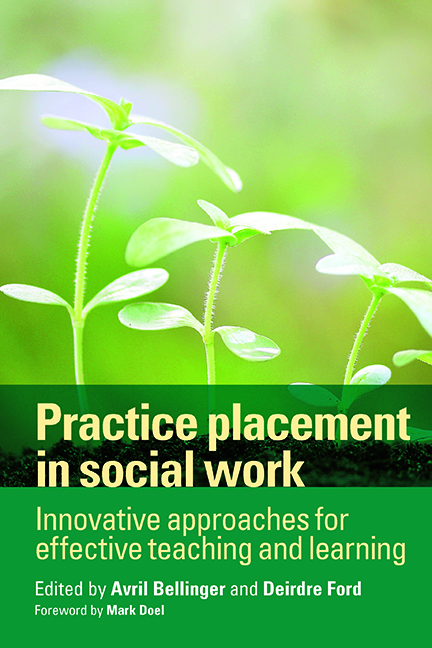Book contents
- Frontmatter
- Dedication
- Contents
- Foreword
- Notes on contributors
- Introduction
- One Student-led services
- Two International placements: learning from a distance
- Three The outside looking in – an independent social worker’s experience of practice educator work
- Four ‘Do you have to be white to pass this course?’ Developing support for black and minority ethnic students in a predominantly white area
- Five Men in social work education: building a gendered alliance
- Six Hidden in plain sight: use of an arts-based method for critical reflection
- Seven Getting our hands dirty: reconnecting social work education as if the earth matters
- Eight Social media for students in practice
- Nine Developing placement capacity in the third sector
- Ten Observations of student practice: what difference does observer qualification make?
- Eleven Filling the gap: constructive responses to the erosion of training standards for practice educators
- Twelve The concept of integrity in relation to failing and marginal students
- Thirteen Cultivating discretion: social work education in practice and the academy
- Index
Twelve - The concept of integrity in relation to failing and marginal students
Published online by Cambridge University Press: 01 September 2022
- Frontmatter
- Dedication
- Contents
- Foreword
- Notes on contributors
- Introduction
- One Student-led services
- Two International placements: learning from a distance
- Three The outside looking in – an independent social worker’s experience of practice educator work
- Four ‘Do you have to be white to pass this course?’ Developing support for black and minority ethnic students in a predominantly white area
- Five Men in social work education: building a gendered alliance
- Six Hidden in plain sight: use of an arts-based method for critical reflection
- Seven Getting our hands dirty: reconnecting social work education as if the earth matters
- Eight Social media for students in practice
- Nine Developing placement capacity in the third sector
- Ten Observations of student practice: what difference does observer qualification make?
- Eleven Filling the gap: constructive responses to the erosion of training standards for practice educators
- Twelve The concept of integrity in relation to failing and marginal students
- Thirteen Cultivating discretion: social work education in practice and the academy
- Index
Summary
Introduction
This chapter considers the issue of how social work programmes can best support students deemed marginal or identified as at risk of failing. Using the lens of ‘integrity’ as a conceptual focus, it addresses the context in which fitness to practise is determined and the processes by which schools of social work may identify, support and manage issues of competence and practice standards. Questions that practice educators may use to determine the extent of concerns and possible options for resolution are applied to a case study and some typical vignettes are offered for reader exploration.
The practice of social work education spans academic and professional perspectives on student achievement, competency, standards and appropriate behaviour. Social work educators – in particular, those involved in practice learning – have first-line responsibility for determining who becomes a social worker (Elpers and FitzGerald, 2012; Robertson, 2013). Ultimately accountable to the individuals, families and communities with whom social work practises, social work programmes become the often-contentious territory where the determination of fitness to practise is most commonly exercised. While academic benchmarks for passing and failing are embedded within all tertiary programmes, an integral component of social work education is the applied professional definitions of competence, capability and standards of practice. Determination of fitness to practise based on judgements concerning a student's conduct, values and ethics, communication skills, or physical or mental health is a far more complex and (some would contend) less objective process. It is a judgement call that presents immense challenges for those tasked with identifying and addressing the issues within social work programmes and practice learning settings (Staniforth and Fouché, 2006), and it is this contested territory that is explored within the chapter.
A note about the concepts and terminology used here is necessary: we make the assumption that the coordination of practice learning and teaching occurs within tertiary education and that preparation for practice occurs within the academy, with exposure to practice sited within the agencies and organisations with whom the schools of social work partner. Practice teachers, in a New Zealand context, are sited within education and we engage with fieldwork supervisors or fieldwork educators who mentor, support and contribute to the assessment of students within the practice agency but who are employed primarily as social workers within and by the field.
- Type
- Chapter
- Information
- Practice Placement in Social WorkInnovative Approaches for Effective Teaching and Learning, pp. 181 - 202Publisher: Bristol University PressPrint publication year: 2016



